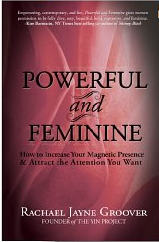Power Posing is heralded as a technique women can use to close the gender gap at work. Women can raise their testosterone (which brings more confidence) and lower their cortisol (which lessens stress) by adopting certain poses before high stress situations. This, in theory, helps to level the playing field.
Writer Jessica Bennett referenced the work of Amy Cuddy, whose TEDTalk details the research behind power posing. Inspired by dramatic differences in class participation between male and female MBA students, Amy sought to encourage women to participate more – to “fake it until they make it.”
[ted id=1569]
We understand the power of nonverbal communication with others, Amy explained, but we often forget that our nonverbals can also influence ourselves. She and her colleague, Dana Carney, asked two research questions:
- Do nonverbals govern how we think and feel about ourselves?
- We know our minds change our bodies, but can our bodies change our minds?
In other words, by adopting the postures of powerful beings, can we convince ourselves that we are, in fact, powerful, and begin to behave more powerfully?
Shy people and those who’ve ever experienced the impostor syndrome, understand what it’s like to shrink on purpose; to take up less space in a given environment. But what if those who would normally make themselves smaller, purposely enlarged themselves? Could that make a difference when it mattered? If you need to adopt a big presence – in the classroom or the boardroom – could you do it at will? Amy’s research suggests yes.
Taking a cue from the animal kingdom, powerful individuals take up space on purpose. They stand tall. They spread out. They expand. She found when humans adopted powerful poses for two minutes, they changed their chemical balance for a time. It turns out, inhabiting big poses and taking up space, raises your testosterone and lowers your cortisol, thereby making you more assertive and less anxious.
Faking confidence by posing “confidently,” actually makes you feel more confident, and you are able to behave more confidently. When you’re more confident and less stressed, in an interview for instance, you can shift the balance of power in your favor.
Power posing is just one of a number of ways many ambitious young women are adjusting their behavior, ever so slightly, to try to correct for a system in which stereotypically male leadership traits (assertiveness, dominance) are rewarded. ~Jessica Bennet
 Amy is encouraging women to adopt masculine techniques in an effort to gain more power in professional settings. But women can be more powerful and simultaneously more feminine. Explains Sojo of the Whiskey, Wine and Moonshine podcast, women can connect with their wombs, adopt feminine movements, and feel grounded and powerful without pretending to be manly.
Amy is encouraging women to adopt masculine techniques in an effort to gain more power in professional settings. But women can be more powerful and simultaneously more feminine. Explains Sojo of the Whiskey, Wine and Moonshine podcast, women can connect with their wombs, adopt feminine movements, and feel grounded and powerful without pretending to be manly.
I’ve spent the past few years actively engaging my femininity, sometimes with astounding results. As a professional who has to perform under a degree of stress regularly, power posing was an interesting idea at first glance. I tried it recently, but it wasn’t right for me. I feel more like me when I am grounded, centered, cheerful, and connecting with others – feelings I access through feminine poses, behaviors and rituals.
What strategies do you use to be your best you? Are you a person who takes up space?
 We talked for nearly an hour and a half. Near the end, she asked me to offer encouragement for newbies.
We talked for nearly an hour and a half. Near the end, she asked me to offer encouragement for newbies.
